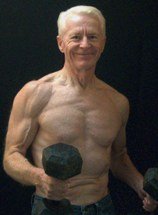Hi

December 1, 2019
In this newsletter . . .
A calm mind is
a healthy mind
In the early (pre-steroid) days of muscle magazine publishing, Bob Hoffman used to write in Strength & Health about a balanced life. He told about the ancient Greeks’ philosophy of moderation in all things. One of his tenets of good mental and physical health was what he termed the "maintenance of a tranquil mind.”Fast-forward to today. With 24/7 news cycles and daily bombardments of life’s discords and ugliness, we have to sometimes wonder if a tranquil mind is even possible. Yet for long-term good health, somehow it has to be. Peaceful walks in the woods or at the shore can be great for recharging your batteries, but such venues are not always available. In their place, short-term breaks from negativity must replace them.
We're all better off if we set aside some time each day for mind and body relaxation. We know that. But when? The answer is to allocate regular brief periods of calmness. The practice of something like Tai Chi or the stretching poses of Yoga or Qi Gong can provide calming of rushed and hurried minds.
Gentle stretching has two primary purposes. The first is to relax the mind and body. The second is to increase or retain flexibility and range of motion, something very important as we age.
We shortchange ourselves by not taking a little time to stretch and relax after workouts. Hurry to the gym, change clothes, hit the weights, and then rush into street traffic home. Rush, rush, rush. When a few minutes invested in calming mind and body following workouts is time well spent.
Here are a few thoughts on relaxed stretching:
- You don’t need to be a contortionist to get the benefits of
stretching.
- Practice dynamic or static movements. To simplify those terms, dynamic stretching means there is more movement involved, such as in Tai Chi, Pilates, and some forms of Yoga. Static stretching refers to the stretch-and-hold types, as in most Yoga practices.
- A third form is ballistic stretching, which is characterized by rapid and sometimes jerky or bouncy movements. This is not appropriate for a workout cooling off period or to calm jangled nerves.
The stretches I choose are a mixture of movements I’ve learned over the years through weight training, martial arts, and Qi Gong. Whatever type you prefer, the
following is sound advice . . .
Don’t force your stretching. Relax into a stretch. That means go only to the edge of discomfort. Then back off just a bit and hold there for a moment, allowing your body to relax. Be soft. By not forcing yourself to go further, your muscles will relax and you will find that you can — softly — move further into your stretch than you thought possible. Now hold for a bit.
Calm your mind and relax your muscles by focusing on breathing, by softly inhaling and exhaling from deep within. If you listen only to your breath, negative thoughts dissipate. Your heart rate slows and blood pressure drops.
It is the calmness break the mind and body craves.
For more stretching and relaxation information, please go here.
Sincerely,
Logan
Senior Exercise Central
If you like the newsletter, we're making it easy to share it . . .





Newsletter Policy
The Gray Iron Fitness Newsletter is a free publication sent twice monthly to subscribers. The purpose is to provide honest and realistic fitness information for people age 50 and above.
I have never been paid or received compensation of any kind to write a positive review or endorse a product. If I say that I personally use a product or service, it is because I find value in it and have paid for it with my own money.
Like newspapers, magazines and television, this newsletter and my web site contain advertising and marketing links. Naturally, I am compensated for these.
The newsletter and web site provide information to help users establish and maintain a fitness lifestyle. But fitness information is not the same as fitness advice, which is the application of exercise and dietary practices to an individual's specific circumstances. Therefore, always consult with your physician for assurance that fitness information, and
your interpretation of it, is appropriate for you.Your comments and questions are always appreciated. Simply click on the "Reply" bottom.
Sincerely,
Logan Franklin
The Gray Iron Fitness Newsletter
www.senior-exercise-central.com


